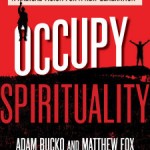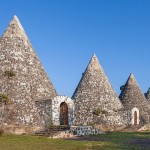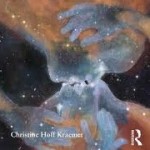Looking for resources that explore the theoretical and theological bases for contemporary Pagan practice? Look no further: here’s an annotated list.
Books
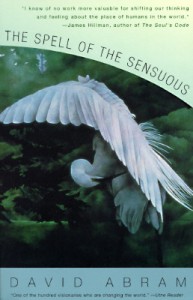 Abram, David. The Spell of the Sensuous: Perception and Language in a More-Than-Human World. New York: Pantheon, 1996.
Abram, David. The Spell of the Sensuous: Perception and Language in a More-Than-Human World. New York: Pantheon, 1996.
Reading level: Academic/Undergraduate
I can’t overstate how important this book is to the development of contemporary animism. Abram argues that without contact with the other-than-human world, human beings’ capacities for perception are badly stunted. He backs up his argument both with Western phenomenology and with his lived experiences studying shamanic practitioners in Bali — but the book is structured so less-academic readers can skip the hardcore philosophy if they prefer. Overall, however, the book is best read as poetry or theology, as Abram’s argument about the transition from oral to textual cultures rests on shaky research that takes him well outside his academic field of expertise.
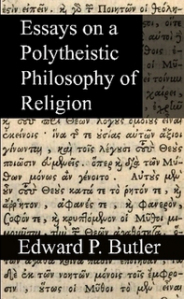 Butler, Edward P. Essays on a Polytheistic Philosophy of Religion. New York: Phaidra Editions, 2012.
Butler, Edward P. Essays on a Polytheistic Philosophy of Religion. New York: Phaidra Editions, 2012.
Reading level: Academic/Graduate
Make no mistake: this is a challenging read and probably requires some pre-existing university-level study of philosophy (especially ancient Greek philosophy) to appreciate. For the Pagan who wants a scholarly basis for a fundamentally polytheistic philosophy, however, this book is satisfyingly sophisticated. (Note: several of the essays were previously published in peer-reviewed academic journals.)
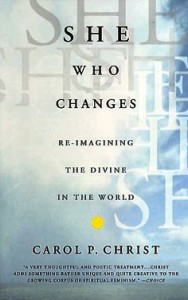 Christ, Carol P. She Who Changes: Re-imagining the Divine in the World. New York: Palgrave, 2004.
Christ, Carol P. She Who Changes: Re-imagining the Divine in the World. New York: Palgrave, 2004.
Reading level: Academic/Undergraduate
Christ has been at the center of the Goddess spirituality movement since the late 1970s. She Who Changes draws on Christ’s formal training in theology to combine Goddess spirituality with process theology. In process theology, divinity is immanent in the world and in a state of constant flux and change–one in which human beings and all things actively participate. Readers will find an accessible introduction to process theology that can be adapted to other Pagan theological contexts.
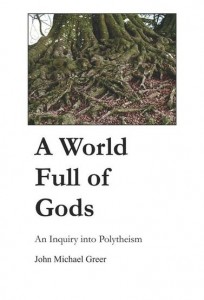 Greer, John Michael. A World Full of Gods: An Inquiry into Polytheism. Tucson, AZ: ADF Publishing, 2005.
Greer, John Michael. A World Full of Gods: An Inquiry into Polytheism. Tucson, AZ: ADF Publishing, 2005.
Reading level: Semi-academic/Undergraduate
This self-published introduction to polytheistic theology by Archdruid John Michael Greer is very useful, but flawed. For readers who know little about theological terminology or want to explore what kinds of religious behaviors and ethics a polytheistic sensibility calls for, it is an excellent read. For those who have a theological background, however, the fact that Greer’s theological knowledge seems to stop around the mid-twentieth century may be frustrating; his portrayal of monotheisms is outdated, and his writing often falls prey to the same kinds of circular arguments and special pleading that he criticizes in others. Typos are common, and a number of references are missing from the bibliography, which makes it difficult to check Greer’s work. Because of these issues, A World Full of Gods is best read as a grounded introduction to Greer’s polytheistic theology rather than an authoritative, scholarly text.
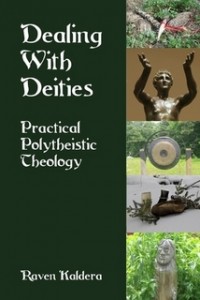 Kaldera, Raven. Dealing with Deities: Practical Polytheistic Theology. Hubbardston, MA: Asphodel Press, 2012.
Kaldera, Raven. Dealing with Deities: Practical Polytheistic Theology. Hubbardston, MA: Asphodel Press, 2012.
Reading level: General audience
The purpose of this book is to introduce its audience to a theological position often called “hard” polytheism — the belief that deities have individual and distinctive existences in the same way as human beings. Kaldera, however, is unusual in the movement for his accepting and compassionate attitude toward other theological positions. His writing is accessible and often personal, and although he uses and explains basic theological terminology, fundamentally his purpose in writing is to make recommendations for polytheistic practice. Kaldera makes no claims to scholarly authority, but his theological reflections on human-deity relationships are rich and come directly from his decades of experience as a practicing shaman.
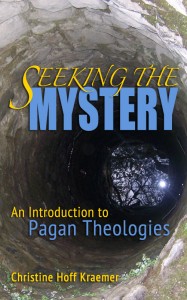 Kraemer, Christine Hoff. Seeking the Mystery: An Introduction to Pagan Theologies. Englewood, CO: Patheos Press, 2012.
Kraemer, Christine Hoff. Seeking the Mystery: An Introduction to Pagan Theologies. Englewood, CO: Patheos Press, 2012.
Reading level: General audience
I wrote this book after noticing that Pagans were increasingly hungry for more coherent theories behind their practice — but that many simply didn’t have the background they needed to read theology. Seeking the Mystery systematically introduces basic theological terminology and concepts relevant to Pagans. At the same time, it also introduces and summarizes Pagan theological writing that already exists (including the books recommended in this post). Most importantly, however, Seeking the Mystery emphasizes not that Pagans need theology, but that they already have it: theologies are attitudes and beliefs that arise out of practice and then inform that practice in an ever-renewing cycle. The book contains discussion questions and activities for individual and group study.
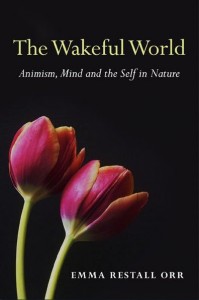 Orr, Emma Restall. The Wakeful World: Animism, Mind, and the Self in Nature. Hants, UK: Moon Books, 2012.
Orr, Emma Restall. The Wakeful World: Animism, Mind, and the Self in Nature. Hants, UK: Moon Books, 2012.
Reading level: General audience/Undergraduate
This is one of several recent sophisticated books on “the new animism,” along with the work of David Abram and scholar Graham Harvey (Animism: Respecting the Living World). I’ve chosen to highlight Druid Emma Restall Orr’s book here since she is writing explicitly for Pagans as a Pagan philosopher and because she draws directly on both of these other writers: her book functions as an introduction to Abram and Harvey’s works, and it is also less textbook-like than Harvey’s Animism. Not just a presentation of the idea that all things have a spirit or soul, The Wakeful World is an argument for adopting an animistic worldview.
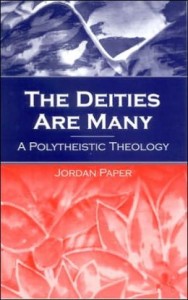 Paper, Jordan D. The Deities Are Many: A Polytheistic Theology. Albany, NY: State University of New York Press, 2005.
Paper, Jordan D. The Deities Are Many: A Polytheistic Theology. Albany, NY: State University of New York Press, 2005.
Reading level: Semi-academic/Undergraduate
Jordan Paper is a religious studies scholar who spent his career traveling the world to study indigenous and shamanic religious traditions. After publishing several academic studies of these religions, Paper wrote this short book during a month-long sabbatical. It is the first book of his that could be considered “theology” as opposed to a more-or-less objective anthropological study. In it, Paper backs up his own polytheistic beliefs with his lived experiences of the traditions he spent his life learning from. The book is a tour of the many approaches to polytheism that can be found around the world. Pagans looking for a how-to on thinking like a Pagan polytheist will probably prefer Greer or Kaldera, since Paper does not identify as Pagan, but they are still likely to resonate with Paper’s eclectic personal spirituality and conviction about the reality of spirits, gods, and ancestors.
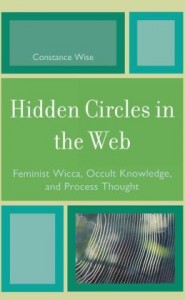 Wise, Constance. Hidden Circles in the Web: Feminist Wicca, Occult Knowledge, and Process Thought. Lanham, MD: Altamira Press, 2008.
Wise, Constance. Hidden Circles in the Web: Feminist Wicca, Occult Knowledge, and Process Thought. Lanham, MD: Altamira Press, 2008.
Reading level: Academic/Graduate
Like Carol Christ, Constance Wise brings formal training in process theology to her work — but unlike Christ, she explicitly identifies herself as a Pagan and her work as Pagan theology. Hidden Circles is a challenging book, but it is chock-full of juicy and innovative ideas: for instance, Wise redefines “occult knowledge” in a feminist framework as inherently experiential knowledge that comes through the body, and she presents not just a process theology of the Goddess, but a process theology of human history and gender. The book’s dense theological passages are lightened by Wise’s personal anecdotes and reflections.
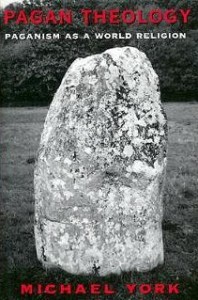 York, Michael. Pagan Theology: Paganism as a World Religion. New York: New York University Press, 2003.
York, Michael. Pagan Theology: Paganism as a World Religion. New York: New York University Press, 2003.
Reading level: Academic/Undergraduate
York’s Pagan Theology attempts to formulate a theology from a sociological point of view. Rather than using Western theological terms or concepts, York looks at indigenous, earth-centered, and place-based religious traditions around the world to identify their commonalities. He argues that these “pagan” religious impulses constitute humanity’s root religion, and that remnants of this first religion remain in all the world’s religions. York seeks to lend legitimacy both to indigenous religions and to contemporary Paganism by presenting this root religion as a coherent worldview — one of four that he identifies, along with the Abrahamic, dharmic, and secular worldviews. Pagan Theology has been heavily discussed in academic circles, and its definition of “paganism” continues to be influential. There is a summary of academic reviews and critiques of the book on Wikipedia.
Websites and Blogs
Arkadian Anvil — Sam Webster, MDiv, Pagan Priest, and PhD candidate, has posted a number of essays on theological topics here (recommended starting point: “Theology Is God-Talk“). He also writes At the Herm for the Patheos Pagan channel.
Theologies of Immanence — A wiki hosting resources on Paganism, pantheism, polytheism, polymorphism, animism, Heathenry, Druidry, Unitarianism, Wicca, and more. Many of the contributors are known writers or scholars. Edited by Yvonne Aburrow, who also writes here at Dowsing for Divinity. (Recommended starting point: “Pagan Theology.”)
Aedicula Antinoi — Essays by polytheist theologian P. Sufenas Virius Lupus (recommended starting point: “Theology vs. Philosophy: What’s the Difference?“). Lupus also writes for the Patheos Pagan channel (recommended starting point: “Polytheology: Syncretism, Process Theology, and ‘Polyamorotheism‘”).
Theology on Dowsing for Divinity — Recommended starting points include “What Is Theology?” (Yvonne Aburrow), “Theology Is Not Religious Studies” (Christine Kraemer), and “Opening a Pagan Theological Dialogue” (Christine Kraemer).
Patheos Pagan Channel — Posts and blogs relating to Pagan theology.
Proteus Coven Library — Essays on Wiccan theology, ethics, and more. (Recommended starting point: “Pagan Deism: Three Views.”)
Theology from Ár nDraíocht Féin: A Druid Fellowship (ADF) — Essays by former Archdruid Ian Corrigan on how ADF understands Pagan theology.
Animism: Respecting the Living World — A companion website to the book of the same name by Graham Harvey.
The Alliance for Wild Ethics — Resources on cultural ecology, philosophy, and animism from David Abram and associates.
PaganTheology.com — This page, which primarily hosts the writings of a UU-identified Pagan named Porphyry, unfortunately seems to be inactive. Nevertheless, there are some useful introductory essays here (recommended starting point: the misleadingly-titled “Theology Is for Christians“), and more recent work by the same author can be found at PaganPages.org.
Did I miss your favorite Pagan theology-related book or website? Let me know in the comments!


